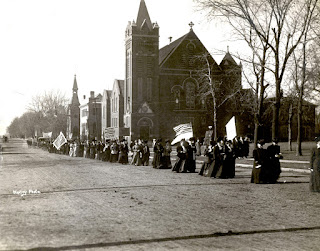The 19th Amendment was ratified on August 18, 1920. Soon we will be celebrating 100 years since women were given the right to vote through this simply stated amendment: "The right of citizens of the United States to vote shall not be denied or abridged by the United States or by any State on account of sex."
Such a simple statement, but with a long and difficult history. What was Iowa's role in allowing women to vote? And what was the atmosphere like where our ancestors lived, in Boone, Webster, and Hamilton counties?
Here's a bit of the history that our ancestors lived.
In 1848 a women's suffrage convention was held in Seneca Falls, New York, at which time there was a call for expanding political rights for women. Little attention was paid in Iowa which had just become a state two years prior. Only after the Civil War when debate centered around the status of former slaves did some Iowans begin to argue for women's right to vote.
In 1894, the Iowa legislature granted women "partial suffrage," the right to vote on bond issues and similar matters but not where there were candidates (men) running for office. In 1916, a bill was voted on in the Iowa state legislature to remove the word "male" as a requirement to vote. But it was defeated, in large part because it was opposed by pro-alcohol advocates and liquor manufacturers (that thought most women were prohibitionists who would curtail the use and sale of liquor), as well as the Catholic Church which stated that, according to the Bible, man was the head of the family, interpreted to mean that only men could vote.
The following anti-suffrage ad appeared in the Iowa Homestead newspaper in 1916:
 |
| One argument against women's suffrage was higher taxes |
In October 1908, a parade was held in Boone, demanding that women be given the right to vote. And today the monument below honors those who marched in this important event. I wonder if any of our ancestors, male or female, marched in this parade.
 |
| Monument located just outside the birthplace of Mamie Eisenhower. |
 |
| The church in this photo is the United Methodist Church in Boone. |
I was recently in Iowa celebrating mom's 93rd birthday. We drove to Boone where I took this picture of the same UMC still standing 110 years later.
As you might expect, Iowans both supported and rejected women's right to vote. Following are several articles, opinions, and jokes from the local newspapers of the day. Just a warning that some of them just might, well,... you'll see.
 |
| Stratford Courier, February 25, 1909 |
 |
| Stratford Courier, May 20, 1909 - A cocktail to make for a man |
 |
| Dayton Review, January 13, 1911 - Sarcasm?? |
 |
| Stratford Courier, May 15, 1913 - Hmmmm |
 |
| Stratford Courier, July 23, 1914 - Shrill lungs? |
 |
| Dayton Review, appeared 6 different times in 1916; "the woman who despises her home" |
Shortly after the amendment passed, this survey of women voters in Marion Township in Hamilton County (home to many of our ancestors) appeared:
 |
| Stratford Courier, September 2, 1920 |
And, the following, as women were preparing to vote for the first time, shows us again a different thought in our history:
 |
| Stratford Courier, October 7 1920 |
Well, that's a sampling of the views expressed during the time our Linn and Olofson, Barquist and Rask, ancestors lived in the Dayton and Stratford areas. These are articles they would have read and might have been influenced by. How would our grandparents have reacted to these articles, these jokes, these put-downs, and the disrespect? How did our own ancestors feel about a woman's right to vote? I wish I knew. None of them were quoted in any articles I found. But I would guess that some were FOR and some were AGAINST the issue.
A major women's advocate for the right to vote in Iowa was Mary Jane Whitely Coggeshall. You can read about her at this link: Mary Jane Whitely Coggeshall.
Carrie Chapman Catt, born in Wisconsin but graduated from Iowa State University in 1880, was also a voice for the suffragette movement.: Carrie Chapman Catt. She was founder of the League of Women Voters.
A quick look at the movement in Iowa, a PowerPoint presentation by the University of Iowa Libraries: The Suffrage Movement in Iowa
Where do you think our Linn and Olofson ancestors stood on this issue? Do you think that our female ancestors voted the very first opportunity they had? It was 100 years ago, yet two women I loved and admired, my grandmothers, would have had the right to vote for the first time around the time they married. I'd like to think that they voted. Your thoughts?

No comments:
Post a Comment